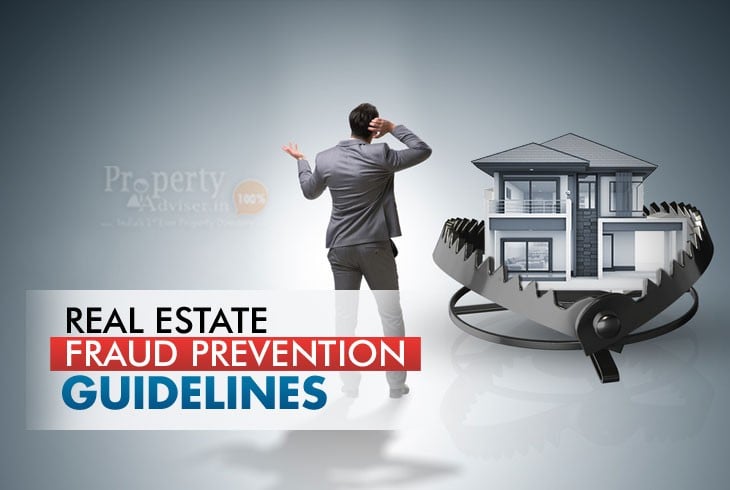Protect Yourself from Real Estate Scams
Wherever there is a lot of money involved, there will be frauds and scams. When planning to buy property, you need to take care that your hard-earned money is not lost in real estate scams and frauds.
How do I protect myself from real estate scams - is a big question in the minds of homebuyers. Don’t freak out, but just exercise a little caution, conduct a bit of due diligence and know-how to avoid real estate frauds. Read about the types of property frauds, real estate fraud prevention guidelines and information on who to report real estate scams to.
Types of Real Estate Frauds
Before going into how to avoid fraud when buying a house, it is important to understand the types of property frauds.
- Delay in delivery is one of the more common types, where the project turnaround time is not as per the commitment, and there is undue delay in project completion and handover,
- Another very common type of fraud is changes in specifications mentioned in the agreement. It could be with respect to the carpet area, interiors, exteriors, materials and fittings used.
- The necessary licenses and permissions for the construction of the building may not be procured and sale agreements and deeds are executed beforehand.
- There could be hidden clauses in agreements that are not favourable to the buyer.
- Title/ownership of the land is not straightforward, or it may be disputed, which will ultimately put the buyer’s investment in jeopardy/
- Real estate agents and brokers may oversell a property in undeveloped areas on false promises of quick development, high appreciation or high returns.
- Fraudulent sales where the same property is sold to multiple buyers.
- Another type of fraudulent sale where a person who is not the owner is posing as owner and executing the sale.
How Do I Protect Myself From Real Estate Scams
After knowing about types of property frauds, it is important to know how to avoid fraud when buying a house. Firstly you need to be aware of some real estate fraud prevention guidelines. Secondly, you need to be aware of who to report real estate scams too.
How to Avoid Real Estate Frauds
So what are the strategies to avoid real estate frauds? Here are a few real estate fraud prevention guidelines so that you can know how to avoid fraud when buying a house:
- Don’t be in a hurry to buy. Conduct due diligence. Check from various sources regarding the rates in the area, and make sure you are being quoted the fair price and not more. Builders may tell you that there are only a few units left and you need to quickly decide, or offer you discounts for booking quickly. However, you take your time to check and decide.
- If you are investing in an underdeveloped area, make double sure if the area will really develop in the near future or at least a decade down the line. Some areas really never develop even after two or three decades. Talk to your family, friends, and any real estate experts in your circle. Parameters like the distance from the airport, proximity from IT parks, and a review of which areas have developed in the past decade should give you an idea if the area that you are planning to invest in will really develop.
- Do not go simply by the images presented in the website, ads, brochures and pamphlets. Make a visit to the site and see for yourself. Ask neighbours and shopkeepers in the area for their views on the location and locality.
- Check the track record of the developers, ask for references of previous buyers to confirm their reliability, read online reviews, Google them to find any evidence of fraud in the past.
- Check if the project is approved by banks for loans, because that is a good indicator of reliability, as banks approve projects only after a thorough inspection.
- Ask for copies of permissions, approvals for the project, as well as that of the title deed. Be sure that the ownership or title are not disputed.
- Read the documents carefully, multiple times, to understand every clause and its implication. Ask your family members also to read the same, so that they can spot something that you may have missed. If possible, also have it read by a legal expert who can caution you against anything that is worrisome in the document. Subsequently, talk to the builder/seller about the clauses or lines that you are not comfortable with, and have them changed.
- Keep visiting the construction site and keep an eye on the materials being used. Carry a measuring tape with you and measure the rooms to verify if the length and breadth are as per the plan.
- To protect yourself from delay in project completion, ensure that the construction timeframe and a delay clause is clearly mentioned in the agreement.

Who Do you Report Real Estate Scams To
To protect you from real estate scams, here are a couple of arrangements made by the government.
RERA Act, 2016
The Real Estate Regulatory Act, (RERA, 2016) is meant to protect the interest of home buyers by providing transparency on builders and projects. RERA is specified in each state to regulate the real estate sector.
To protect you from real estate scams, RERA requires developers to register themselves and also the project, before advertising any project, commencing any construction or executing any sale. Builders need to submit all the original documents with RERA. They also need to escrow 70% of the amount taken from buyers, that they can withdraw as the project progresses, with due certification from architects and project engineers. This ensures that the project is genuine, and it is moving forward towards completion.
So who do you report real estate scams to? You can report to RERA, as it also acts as an adjudicating body for redressal of disputes and fast resolution. They have a website in each state.
Class Action with NCDRC
When all buyers are affected by the same cause, on the same project and are seeking the same relief, they can file a class action suit with the National Consumer Disputes Redressal Commission (NCDRC), provided all the buyers have made complete payment and there are no defaults.
In conclusion, make sure that the builder and the project are registered with RERA, and take all the precautions necessary to avoid real estate frauds.












